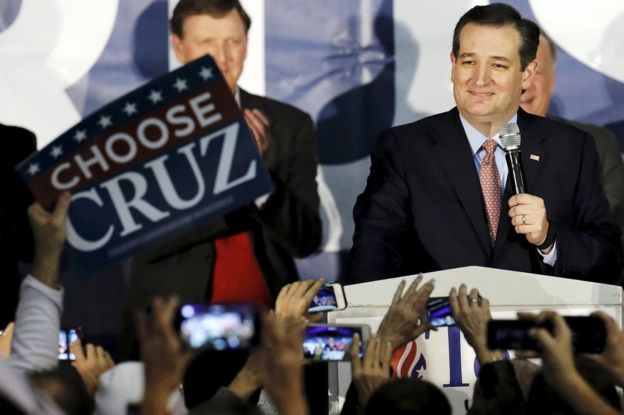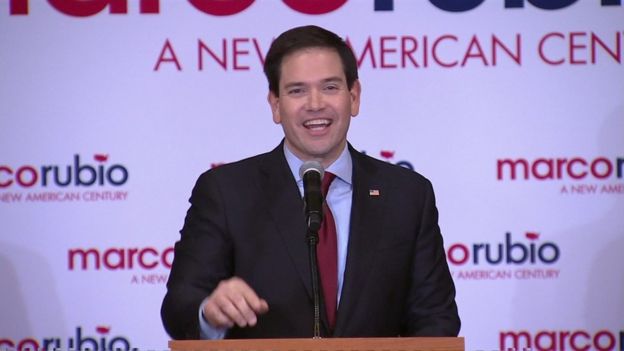Texas Senator Ted Cruz has won the Iowa Republican caucuses, the first vote of the US 2016 presidential election.
“Tonight is a victory for courageous conservatives,” he declared, to great applause, as he railed against Washington, lobbyists and the media.
He took 28% of the Republican vote, beating his rival, the once frontrunner Donald Trump, and Marco Rubio.
Votes in the Democratic race are still being counted, and some US media have declared it a dead-heat.
With 95% of results confirmed, Hillary Clinton clung to the narrowest of leads over Bernie Sanders and told supporters she was “breathing a sigh of relief”.
The former secretary of state and first lady stopped short of declaring victory, and her rival, a 74-year-old senator from Vermont said it was a “virtual tie”.
No such ambiguity from Republican victor Mr Cruz, whose triumph was reward for the months he spent criss-crossing the state to woo its influential conservative and evangelical leaders.
As country music blared across the loud speaker at his Des Moines rally, the 45-year-old fiery conservative, who has been a thorn in the side of his party, relished his victory.
Analysis – Anthony Zurcher, BBC News, Iowa
In the end it was a victory for organisation over enthusiasm. Despite trailing Donald Trump in the polls for much of the last two weeks, Ted Cruz swept to a comfortable win in Iowa.
During his victory speech, he repeatedly thanked his grass-roots support – and for good reason. He and his campaign had invested considerable time and money to grind out a victory in this key state, and they were ultimately rewarded for their efforts.
With this result Mr Cruz now has the momentum to survive what looks to be an uphill battle among the more moderate voters in New Hampshire and then win over the deeply conservative, evangelical voters of Southern states that dominate the primary calendar in the following weeks.
It appears increasingly likely that a showdown for Mr Cruz looms on the horizon with the surprise third-place finisher in Iowa, Senator Marco Rubio. And Mr Trump – even if his supporters didn’t turn out in the numbers expected – will surely remain a factor.
“Iowa has sent notice that the republican nominee and the next president of the United States will not be chosen by the media, will not be chosen by the Washington establishment,” said Mr Cruz.
“Tonight is a victory for courageous conservatives across Iowa and all across this great nation.”

Ted Cruz

Marco Rubio gave a speech that was like a victory rally
Mr Trump congratulated the Texas senator and said he was “honoured” by the second-place finish.
Mr Rubio, who has struggled to gain traction in recent months, has performed far better than expected, and finished in third place – just one percentage point behind Mr Trump.
Meanwhile, two candidates are bowing out.
Sources close to Democrat Martin O’Malley, former Maryland governor, have told the BBC that he will suspend his campaign – narrowing the field to two competitive candidates.
On the Republican side, Former Arkansas Governor Mike Huckabee tweeted that he too would suspend his campaign.
More on Senator Ted Cruz

What would a Cruz presidency be like? Imagining the first terms of Mr Cruz and other candidates
Three things Ted Cruz says: A 60-second summary of the Republican candidate’s stump speech
The Texan Tea Partier: Ted Cruz’s rapid, rocky ascension to presidential candidate
How does a US election work? If you want to be president, it helps to be governor, senator, or five-star military general – and have lots of patience
Special report: The BBC’s full coverage of the race to the White House
Iowa has an unusual election system called a caucus, which involves people gathering at private homes, schools and other public buildings across the state.
Democratic voters divide themselves into groups based on their preferred candidate, but the Republican caucus process is more like a traditional ballot.
Over the coming months, the other 49 states as well as US territories will vote for the party nominees.
Each states’ delegates will be tallied and a nominee will become apparent as the summer draws near.
In November, the US will pick who its next president will be. He or she will assume office in January 2017.
BBC
 Q FM Africa's Modern Radio
Q FM Africa's Modern Radio